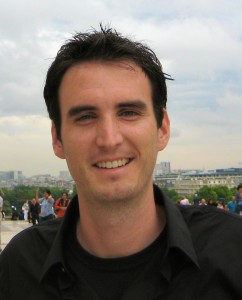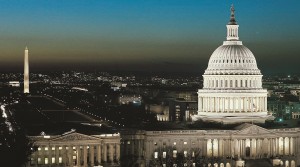January 24, 2014
The Biggest Surprise
Posted by Erik Hankin
Written by Aaron Goldner, PhD., AGU/AAAS Congressional Science Fellow
The safe confines of my coffee shop and flashing terminal screen became the mainstay during my doctoral studies at Purdue University. As a computational modeler you spend days buried under lines of code trying to find a bug that you think exists somewhere between line 200 and 1000. I loved every minute of it, especially the times when you had a breakthrough, which could be as simple as watching the climate model produce output without crashing. I walked away from this world in August to head to Capitol Hill as a Congressional Science Fellow sponsored by the American Geophysical Union. I am currently working in the Office of Senator Sheldon Whitehouse focusing on environmental and ocean policy.
Four months into the fellowship, I returned back to visit friends at Purdue and many were eager to ask about what was going on with the fellowship and what I thought about politics in D.C. The answer came pretty naturally as it has been something I have thought about after each day as I head home on the metro.
From an outside perspective, I think its safe to say the political environment in Washington D.C. looks pretty dismal, as the political world seems at a standstill. I have had many conversations with professors, friends, and colleagues who share a very similar opinion. Many wondered why now would be a good time to spend a year in Congress. As a young scientist who believes that climate change is the most significant issue we face, I had to know more about how the climate change science interacts with policy.
I told them that there are three things that have really stood out to me so far.
- First, people working for Congress are engaged, diligent, and thoughtful about how they address and solve problems. Yes politics exists, but there is an engrained hardworking environment that does not shows up in the daily news cycle. Groups of staff work tirelessly to make sure every last detail is ready and correct for the Congress Member for their hearing or meetings and many work late into the night and on weekends.
- Second, countless interactions I have had always leave me impressed with the level at which people on Capitol Hill deeply care about the issues or legislation they are working on even if bills are not becoming law. Staffers diligently prepare talking points or craft amendments to proposed legislation even though it is unlikely that their work will be used.
- But the biggest surprise is that legislators and staff members respect and value scientists and wish there was more scientific input in decisions that require technical backgrounds.
So my main message to my friends and colleagues is this: Not all scientists need to engage with politics, but we need a larger group that does. Scientific decisions get made daily with our without input from scientists, but this does not have to be the case.
If you are a scientist who has an interest in policy or how science interfaces with political decision making then you should consider options that give you an experience to do so. Involvement could consist of designing and event at your local campus, visiting a federal or state legislator, or seeking out a policy fellowship experience.
We live in an environment today that has an ever growing need for scientists to engage in cross-disciplinary problem solving and a world that requires basic policy understanding. If more scientists are up for the job now is our time to really engage beyond our labs and coffee shops to work alongside our state and federal legislators to influence decisions that so desperately need our expertise.











[…] writing on The Bridge: Connecting Science and Policy (part of the AGU blogosphere) recently posted Aaron’s perspective on his Hill work to date. It’s worth passing along in its […]
Dear Erik,
I find very interesting your article. I have an article in my blog about the perception of scientist by society which I believe relates with some points from your article. I would like to have your thoughts about it.
Science, scientists, researchers, policy-makers, and the rest of society.
http://diegofdezsevilla.wordpress.com/2013/11/28/thick-as-a-brick/